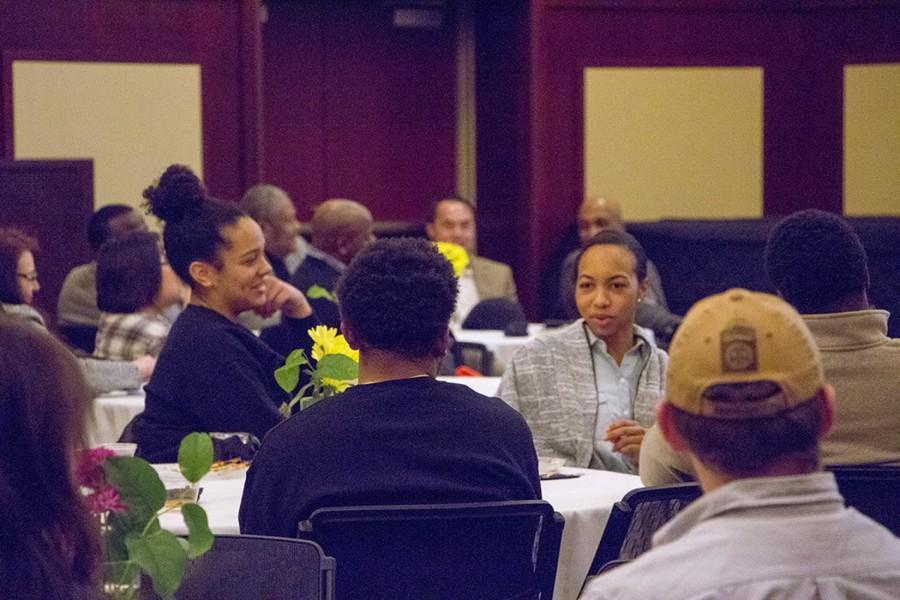Black History Month recognizes African American veterans
Black Student Alliance kicks off a month of events with veteran reception dinner
More stories from Andee Erickson
Photo by Kendall Ruchti
The Black Student Alliance presented the Black History Month dinner reception Feb. 5, which honored African American veterans. BSA executive members Laura McDew, left, and Kiana Veal engage in conversation at the reception.
The UW-Eau Claire celebration of Black History Month began its series of events with a reception dinner honoring African American veterans and the speeches of two veterans Friday night in the Dakota Ballroom.
Associate professor of history, Professor Selika Ducksworth-Lawton, explained the effect veterans had on the civil rights movement before she introduced the two speakers.
When African American veterans served during the Jim Crow era, they weren’t just serving the nation but paving the way for others to rise up, said Ducksworth-Lawton, who holds a doctorate in African American military history.
“There’s a long history of the link between veteran service and civil rights,” Ducksworth-Lawton said during her introduction.
Ducksworth-Lawton introduced retired air-force sergeant, Jesse Dixon, a Vietnam veteran whose stories about integration in the military help shape the world today, she said.
Dixon served in the air force for 21 years before joining the Office of Multicultural Affairs on campus, where he was director for 11 years until his retirement last August, he said.
He joined the military as an opportunity to escape negative environments that presented limited opportunities for people of color, Dixon said in his speech.
“You find that there’s a whole new world out there,” Dixon said, “… and once those seeds are planted and one goes back to their environments, that’s where those changes begin to occur.”
During his service, Dixon said he noticed how the base commander of the air force made the decision of who got promoted, and selection often reflected who the commander socialized with, which usually weren’t people of color.
The air force introduced the Weighted Airman Promotion System in the 1970’s, which meant promotion was then determined based on knowledge of the military overall and knowledge of one’s particular career field, Dixon said.
“There was an explosion of promotions for people of color once that system was implemented,” Dixon said.
Berlye Middleton, the second speaker of the evening, never envisioned himself in the military, nor did he ever think he would want to serve, Middleton said in his speech following Dixon’s.
Born in Arkansas and raised in Milwaukee, the wars occurring in the late 1950’s and early 60’s affected local communities, Middleton said.
“We did not need to go overseas in order to do battle,” Middleton said. “We did not need to go overseas to see gunfire or see violence.”
While growing up, Middleton’s mother taught him the value of discipline, he said. After moving to Eau Claire for a position at Luther Hospital developing an alcohol and drug abuse program, it was the opportunity to gain discipline in the military that raised his interest, Middleton said.
He then served in Kosovo as an equal opportunity officer where he oversaw fair treatment of 9,000 troops on the U.S. base. The military taught soldiers there’s a standard way people should be treated, Middleton said.
“I’m very proud of being an African American,” Middleton said, “and I’m very proud of being an African American who represents the military and represent the military very proudly.”
Maria Delgado Gomez, first-year geology student, attended the reception Friday night. The speakers were frank, charismatic and they left an impression, Delgado Gomez said.
“I didn’t know there was so many contributions,” Delgado Gomez said. “So many things yet to be learned and to be admired of these people whom sometimes their accomplishments are ignored by society.”

